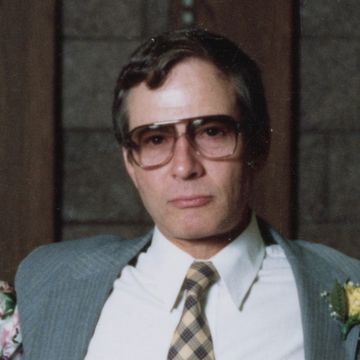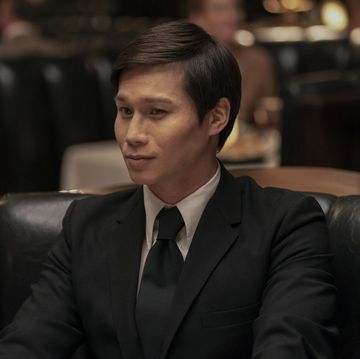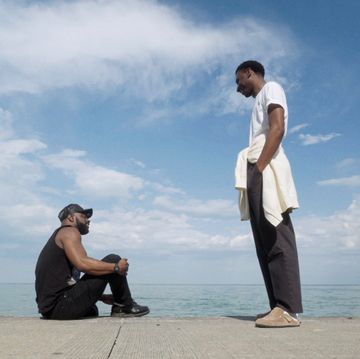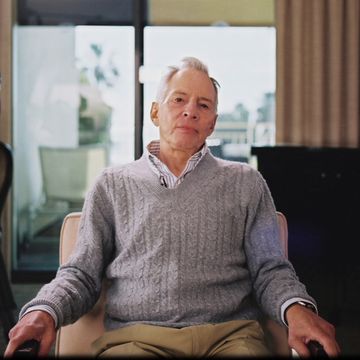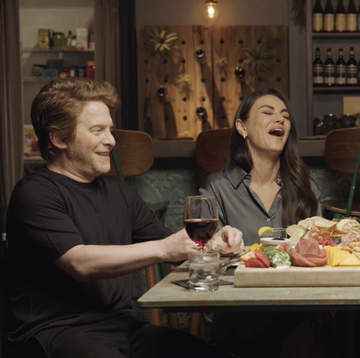Season 6, Episode 12: "The Quality of Mercy"
Contrary to previously floated theories, Bob Benson is not a government spy attempting to investigate Don Draper's actual existence as Dick Whitman, nor is he some coffee-fetching, Pete Campbell-admiring alien from outer space. As we finally learned in this week's episode of Mad Men, he's just an ambitious liar, a guy willing to concoct an inflated, patently false personal history — including a non-existent undergraduate degree from Beloit College and connections to Brown Brothers Harriman — in order to ascend the ladder at an ad agency where truth and justice seemingly have nothing to do with the American way.
"I've never seen anything like this before," Duck Phillips told Pete Campbell after he uncovered Benson's massive resume deception.
Pete, suddenly aware he might not be able to shove Bob into some other job and far away from touching distance of his clearly alluring knees, had only one reply: "I have."
Yes, that's the big Bob Benson secret: that he's Don Draper all over again. Which is actually a little disappointing. I was hoping Bob was operating an even longer long con that would somehow, via that deliciously silly idea about government spy work or simply good old fashioned blackmail, force Don's true identity to be revealed. But Bob doesn't seem to have any knowledge of Don's deception. He's just yet another have-not who possibly prostituted himself — the previous job title "man servant" sounds like it may have involved some sexual favors, which may partly explain why Bob felt he needed to make himself "available" to Pete — then used a combination of personal dishonesty and sycophantic behavior to get ahead. Yeah, we've seen this before, too. And if Don is any indication, Bob may not only get away with his ruse, but possibly even excel at Sterling Cooper & Partners without ever experiencing any appropriate sense of public shame. Private shame, however, is another matter.
Before I continue, I must pause and acknowledge how much I want to spend more of this week's recap discussing the many hilarious moments in this penultimate episode of season six, which apparently saved up a lot of the funny that eluded us earlier in the season and unleashed all of it in a single hour. Believe me, I want to spend some serious time on the fact that Ken Cosgrove got shot in the eye by the lunkheads at GM, initially prompting half the Mad Men audience to shout "Oh my God! They killed Kenny!" until we realized Ken merely suffered an eye injury that made him resemble Moshe Dayan, the former Israeli minister of defense and Vietnam War critic previously featured in that poster above Stan Rizzo's bed.
I want to explore the fact that Sally's new disdain for her father has pushed her into that ultimate act of teen rebellion: enrolling in an all-girls boarding school where she can finally put her long-held skills as a clandestine cigarette smoker and mixer of cocktails to good use, not to mention hang out with Glen and the highly handsy Rolo. And I could seriously spend all of today and possibly tomorrow describing how sublime it was when Joan, acting as "Jewish neighbor lady" in Peggy and Ted's Rosemary's Baby-inspired aspirin commercial, clucked: "How about a bowl of chicken soup?" Please, someone, film her saying that and send the reel directly to Woody Allen ASAP. (By the way, in case anyone didn't catch the double meaning of using Rosemary's Baby in a St. Joseph's ad, it's worth noting that John Cassavetes's character in that movie — you know, the husband who sold wife Mia Farrow's womb to Satan — was an actor who had previously appeared in an aspirin commercial.)
But instead of spending more time on those matters, it's more pressing that we understand precisely what happened this week between Bob Benson and Pete Campbell, and between Don, Ted, and Peggy. So let's begin with Bob and Pete.
Once Pete realized that Bob Benson was less a real person than a hologram of a real person, it seemed inevitable that Pete would rat him out. In that previous meeting with his fellow SC&P partners, Pete made it clear he didn't want to work with Bob on the Chevy account inherited from One-Eyed Cosgrove. After receiving Duck's intel, all Pete had to do was reveal Bob's lack of legit credentials.
But Pete's been to this rodeo before. The last time he tried to pull a "Gotcha!" by outing Don to Bert Cooper, the response was, basically, "So what?" Pete knows that people like Bob are better long-term liars and manipulators than Pete "No Poker Face" Campbell. So he laid down some ground rules for Bob and let the faker continue his faking because that gives Pete the upper hand. Bob's future depends on Pete's silence, and Bob knows it. So when his non-stop suck-up-ery leads him to bigger things — and it will because, hi, this is America — Pete is guaranteed to reap the benefits as well.
As for why Bob is playing such a dangerous game, it's very simple: He's, as Vulture's Matt Zoller Seitz and others have pointed out, a sociopath. A kind sociopath who sometimes helps pretty ladies deal with their ovarian cysts in a discreet manner, but a sociopath all the same. From his perspective, perhaps there's something exciting about proving that it's truly possible to succeed in business without really trying.
Which brings us to Don, who for all of his own sociopathic behavior, actually has something Bob Benson does not: experience and legitimate talent at crafting a solid ad. Don hit a new low this week, even for Don. He stayed home from work to drink vodka and avoid dealing with Ted Chaough. But even when he pulled a sick-day sneak-out to the movies, well, what do you know? There's Ted Freakin' Chaough with Peggy, the colleague Don once ran into at a matinee when she was sitting alone and happy to see her former mentor. Now Peggy's laughing it up all over the movie house and the office with Ted, the two of whom are clearly in love if not necessarily consummating their feelings. And Don cannot stand it.
He cannot stand it because Peggy was once enamored of his talents, and now she thinks Ted is both a better ad man and a better man, period. He cannot stand it because the joy Peggy and Ted share in each other and their work is what Don once enjoyed with Megan but no longer can. He cannot stand it because all this is happening at the same time that his own daughter has lost faith in him. And he really cannot stand it because once, back in season four, a New York Times reporter told Don that Ted Chaough said, "Every time Don looks in his rearview mirror, he sees me." And now Don is just looking in a regular old mirror, every day, at Ted, and seeing the better version of himself he can't be: the brilliant conceiver of commercials who is honest, connected to other people, and capable of acting without ego.
Don responded to all of these feelings by acting like a baby, minus the wah-wahs he delivered in that St. Joseph's ad: He dangled the prospect of publicly revealing Ted's affections for Peggy in the middle of a budget meeting over that very same ad. He purposely draaaaaagged out the moment — "It's okay. Tell him, Ted. You don't want to say anything? I'll tell him" — making Ted sweat (Kevin Rahm clearly won the Emmy for best nervous twitching in that scene) and then, by suggesting that the idea for the ad was actually Frank Gleason's, stealing the credit away from Peggy. It was as mean-spirited and dark as Don has ever gotten.
And yet, when Peggy confronted him, Don's explanation was: "I'm just looking out for the agency." Which sounded an awful lot like Bob Benson's previous comment to Pete: "This is not about my own interest. I care about Chevy." These guys aren't behaving according to their own selfish whims. Oh no, they're acting for the greater, inarguable good.
There's a passage in Joan Didion's "On Morality," an essay that appeared in her book Slouching Towards Bethlehem, which, coincidentally, was published in 1968. It says the following:
"When we start deceiving ourselves into thinking not that we want something or need something, not that it is a pragmatic necessity for us to have it, but that it is a moral imperative that we have it, then is when we join the fashionable madmen, and then is when the thin whine of hysteria is heard in the land, and then is when we are in bad trouble. And I suspect we are already there."
Don Draper has convinced himself that it's a moral imperative for him to continue calling the shots at SC&P. Peggy says that makes him a monster. I just wonder whether, come next week's finale, it will finally get him in some really bad trouble.
An illustrated recap by Chris Piascik for Unlikely Words.
Read Esquire's Mad Men Recap Every Week on The Culture Blog >>
PLUS: Stephen Marche on Why We Love Mad Men and What the Show Really Gets Wrong >>
Follow The Culture Blog on RSS and on Twitter at @ESQCulture.



